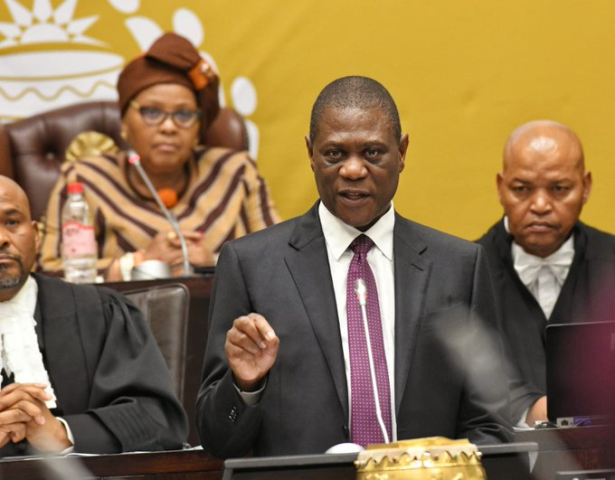A National Reckoning: Mashatile Pushes for Action Against GBVF Crisis
The Deputy President condemned such inhumane treatment and used the opportunity to highlight the urgency for comprehensive justice and societal reform.

- Country:
- South Africa
South Africa is facing an ongoing and deeply entrenched crisis of gender-based violence and femicide (GBVF), prompting Deputy President Paul Mashatile to call for a nationwide dialogue and urgent reform. His strong stance was made during a parliamentary session where he addressed the growing outcry over escalating GBVF cases and the systemic weaknesses in justice and protection systems.
The urgency of his message was underscored by alarming statistics recently released by Statistics South Africa (Stats SA) and the Human Sciences Research Council (HSRC). According to Stats SA, one in three South African women aged 16 and older has experienced physical violence, while one in five has been subjected to sexual abuse. Echoing these figures, the HSRC report indicates that 33.1% of women aged 18 and above have endured physical violence at some point in their lives.
“These statistics are not just numbers,” Mashatile emphasized, “they reflect a deep societal wound. We cannot allow this situation to continue unchallenged.”
Shocking Case Sparks National Outrage
Mashatile’s call comes in the wake of a heartbreaking case involving a seven-year-old girl from Matatiele, known only as Cwecwe, who was reportedly subjected to brutal abuse. The Deputy President condemned such inhumane treatment and used the opportunity to highlight the urgency for comprehensive justice and societal reform.
“The pain inflicted on Cwecwe and countless other victims is a stain on our nation’s conscience,” he declared. “Justice must not only be swift—it must be just and victim-centred.”
Efforts to Reform the System
Mashatile acknowledged the longstanding inefficiencies in how GBVF cases are handled by law enforcement and the judiciary. He pointed out that the National Prosecuting Authority (NPA) has taken steps to reverse this trend by adopting a more victim-focused strategy.
Key among these is the Sexual Offences and Community Affairs (SOCA) Unit, which now oversees GBVF case management. The unit facilitates continuous training for prosecutors on gender sensitivity, trauma-informed approaches, and effective prosecution strategies.
Further bolstering this response is the Thuthuzela Care Centre Model, an initiative under SOCA that provides integrated support services to GBV victims. These one-stop centres are designed to streamline the legal and healthcare response, ensuring survivors receive compassionate, coordinated care.
According to Mashatile, this model has contributed to a noticeable increase in GBV conviction rates. “We are seeing progress,” he said, “but we cannot afford to become complacent—there is still much more to be done.”
Controversial Acquittal Raises Accountability Questions
Adding to public concern was the recent acquittal of Nigerian televangelist Timothy Omotoso, whose high-profile trial dragged on for over eight years. Omotoso, the founder of Jesus Dominion International, faced multiple charges including human trafficking and rape. His release has reignited debates over how GBVF cases are prosecuted and whether victims are adequately protected.
Mashatile addressed these concerns by confirming that the Eastern Cape Director of Public Prosecutions is considering an appeal and reviewing the conduct of prosecutors involved in the case. He stressed that internal accountability within the justice system is critical to restoring public trust.
Inter-Ministerial Coordination for Systemic Change
To advance a holistic approach, Mashatile noted that the Department of Women, Youth and Persons with Disabilities has initiated measures aimed at improving oversight, accountability, and systemic reform in GBVF-related institutions.
He highlighted his role as Chairperson of the Cabinet Committee on Justice, Crime Prevention, and Security, where he recently met with the Ministry of Women, Youth and Persons with Disabilities. The goal: to ensure coordinated inter-ministerial accountability in addressing GBVF.
“We must embed a culture of zero tolerance, not just in word but in action,” he stated. “Our government must be united, deliberate, and transparent in its fight against this pandemic.”
A Call to All South Africans
Mashatile concluded his parliamentary address with a call to every sector of society—government, civil society, religious institutions, communities, and individuals—to participate in an open national conversation about gender-based violence.
“This is a moral crisis. We must raise our voices not in mourning, but in resolve. Let us build a country where every woman, every child, can walk free of fear,” he urged.
As South Africa grapples with the magnitude of this challenge, Mashatile’s appeal underscores the need for not only reactive justice, but also proactive, systemic, and cultural transformation.










